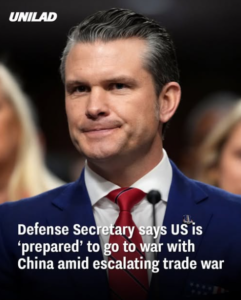In recent developments, U.S. Defense Secretary Pete Hegseth has asserted that the United States is “prepared” for a potential conflict with China, amid escalating tensions stemming from a burgeoning trade war.
Escalation of Trade Tensions
The current strain between the U.S. and China intensified following President Donald Trump’s announcement of an additional 10% tariff on Chinese goods, elevating the total duty to 20%. This decision was reportedly linked to concerns over China’s role in the U.S. opioid crisis, particularly regarding the production of fentanyl.
In retaliation, China imposed duties of up to 15% on U.S. agricultural products, signaling a readiness to “fight to the end” in any conflict, whether it be a trade war or otherwise.
Military Preparedness and Diplomatic Stance
In response to China’s assertive rhetoric, Defense Secretary Hegseth emphasized the importance of military readiness. He stated that the U.S. must maintain a strong and modern military to deter potential adversaries, highlighting that “those who long for peace must prepare for war.”
Hegseth also noted that while the U.S. does not seek conflict, it is essential to be prepared for any eventuality, underscoring the need for strength to prevent miscalculations.
China’s Position and Military Developments
Concurrently, China has announced a 7.2% increase in its military budget, reflecting its commitment to bolstering defense capabilities amid rising tensions with the U.S.
Chinese officials have expressed a firm stance against U.S. actions, with Foreign Ministry spokesperson Lin Jian stating that China is prepared to defend its interests resolutely. This sentiment was echoed by the Chinese Embassy in the U.S., which conveyed readiness to confront any form of conflict initiated by the U.S.
Historical Context and Strategic Concerns
The current situation is reminiscent of past geopolitical tensions. After President Trump’s election victory, Chinese President Xi Jinping expressed concerns about potential isolation similar to that experienced by the Soviet Union during the Cold War. The U.S.’s aggressive trade policies and efforts to overhaul the global trading system have exacerbated these fears, leading China to adopt a more defensive and assertive posture.
Calls for Dialogue and De-escalation
Despite the escalating rhetoric, there are calls for renewed dialogue to prevent further deterioration of relations. U.S. Defense Secretary Lloyd Austin emphasized that war with China is neither imminent nor unavoidable, stressing the importance of communication to avoid miscalculations. He highlighted that continuous dialogue is crucial to manage tensions and maintain stability in the region.
Conclusion
The escalating trade war between the U.S. and China has led to heightened military preparedness and assertive rhetoric from both sides. While the U.S. emphasizes its readiness to defend its interests, China has responded with equal determination to protect its sovereignty. Amid these tensions, the importance of diplomatic engagement and dialogue cannot be overstated, as both nations navigate this complex geopolitical landscape to prevent unintended conflicts.


